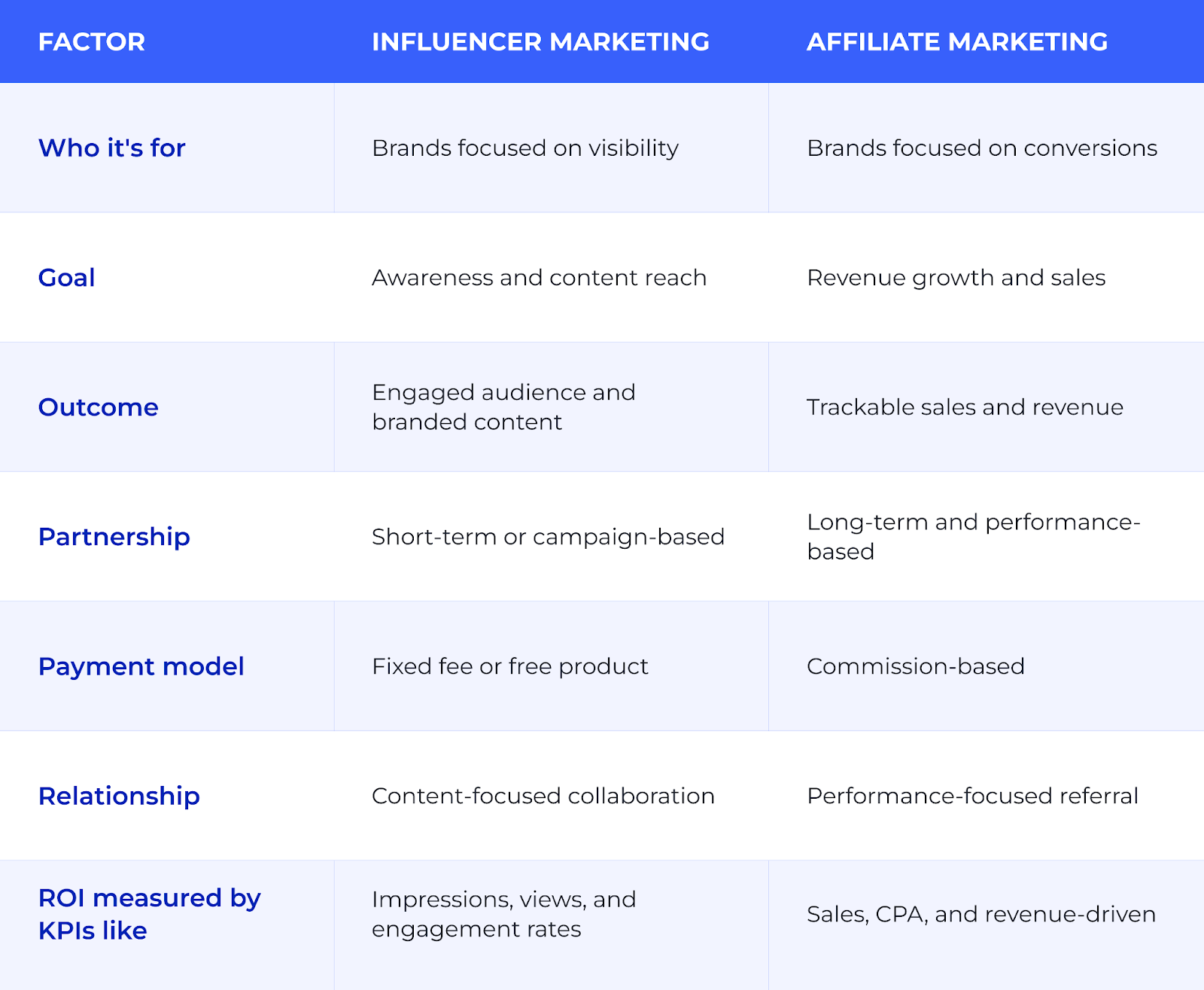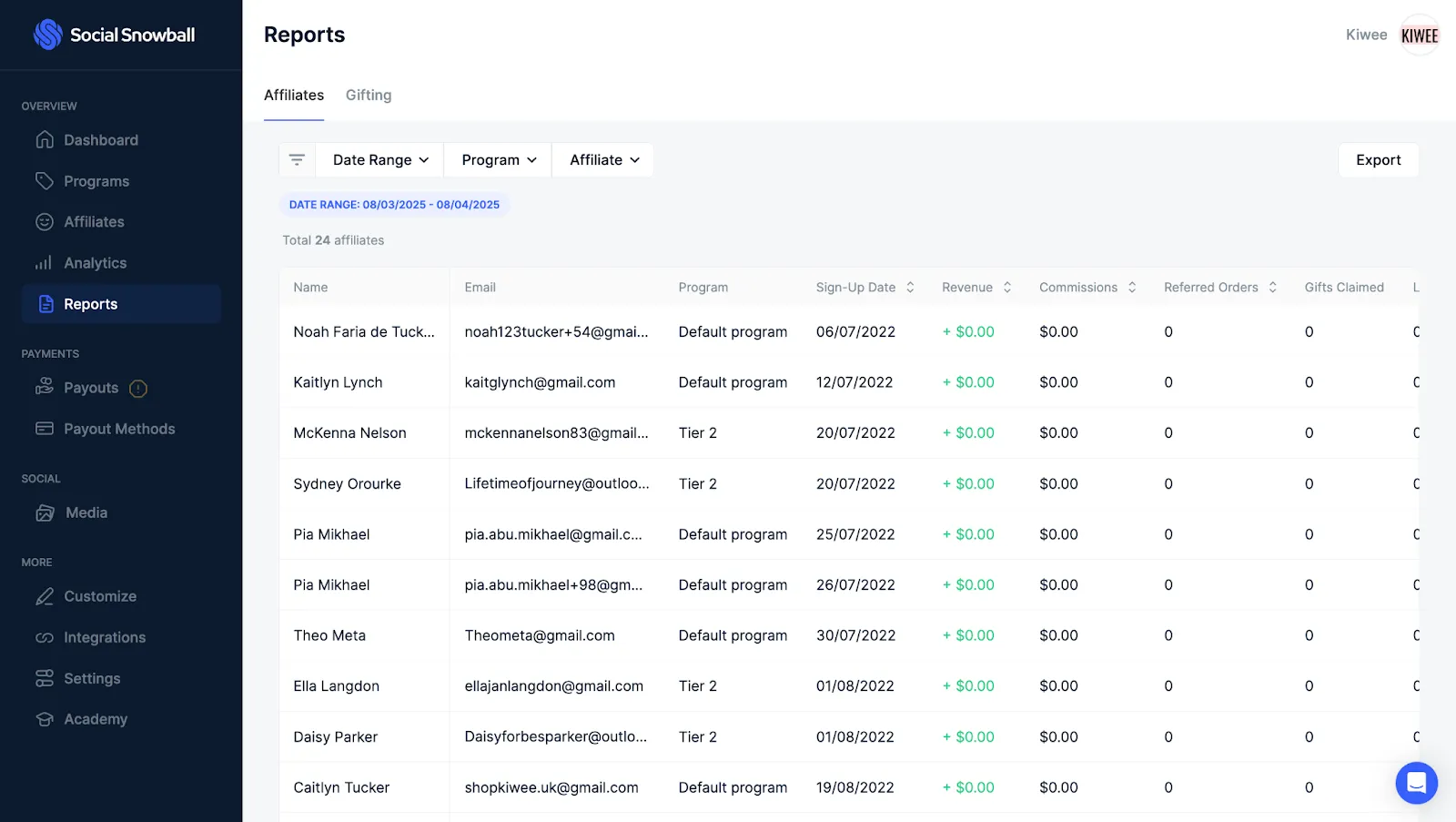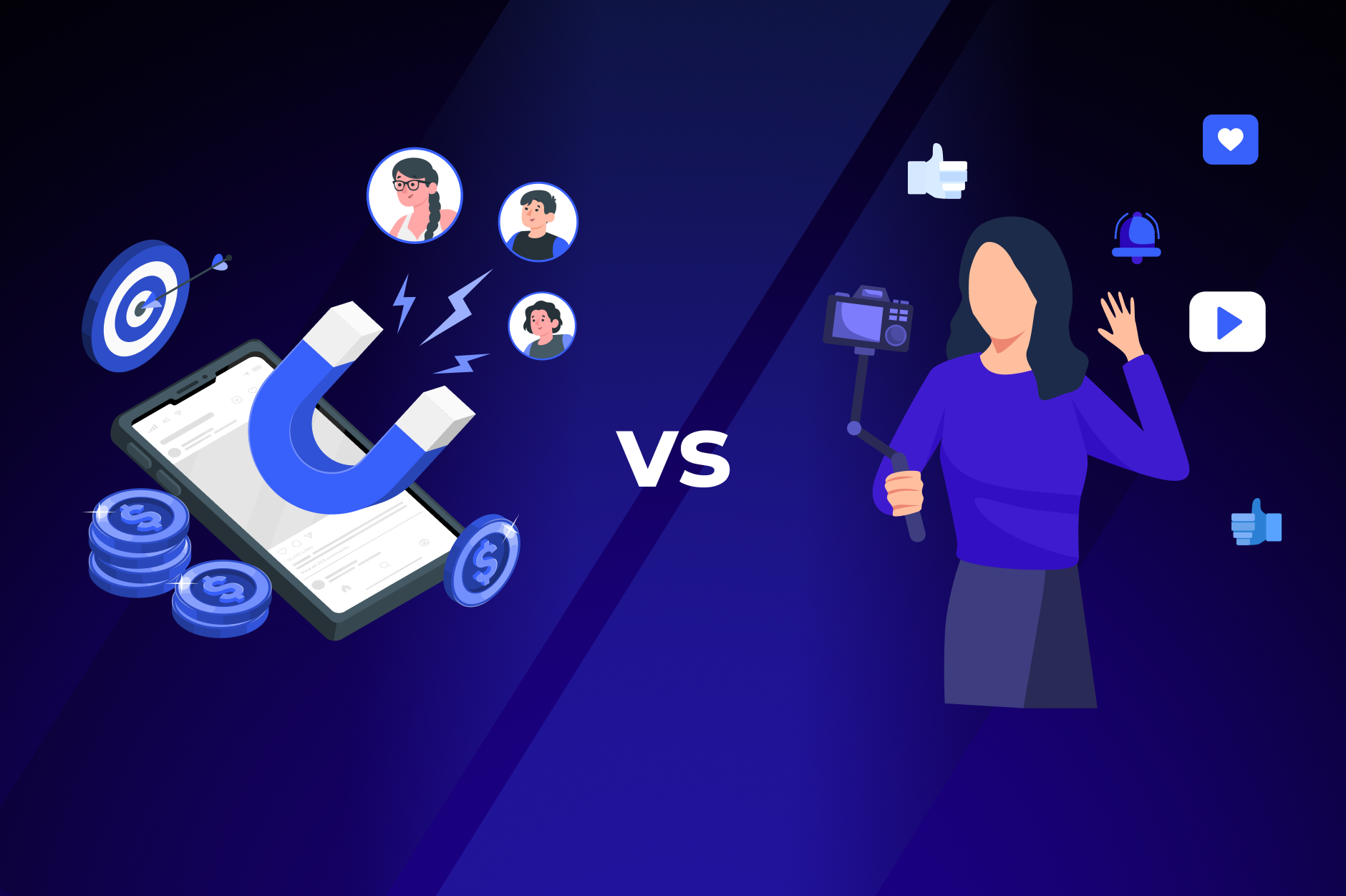Not all word-of-mouth drives the same results.
Influencer marketing is designed for visibility, making it great for launching products, creating buzz, and generating content. Affiliate marketing, on the other hand, is a performance-based marketing strategy. It’s about lead generation, tracking return on investment, and scaling sales efficiently.
Which strategy you choose and knowing how to use both can impact how your brand grows. In this post, we’ll break down how each strategy works, where it fits in your funnel, and how to pick the right approach for your ecommerce brand based on your goals, resources, and growth stage.
Key difference between influencer marketing vs affiliate marketing
Influencer marketing and affiliate marketing are often used interchangeably, but they work very differently. Both rely on creators to endorse your brand, but the intent, compensation, and performance tracking are very different.
If you're deciding which digital marketing strategy to prioritize (or how to combine both), here is a breakdown that will help you pick the right approach based on your goals and needs:
Influencer marketing:
- Who it's suited for: Great for newer brands, product launches, or reaching wide audiences fast. Ideal when you're focused on brand visibility.
- Goal: Build brand awareness and buzz.
- Outcome achieved: More reach, engagement, and content.
- Partnership type: Short or campaign-based (often project-to-project).
- Payment model: Flat fees, free products, or bonuses for content.
- Relationship type: Brand-content creator relationship. They act more like brand ambassadors or media partners.
- ROI measurement: Tracked via impressions, social media engagement, follower growth, etc.
Affiliate marketing:
- Who it's suited for: Best for established brands focused on scaling sales efficiently. Great when you want performance-based growth.
- Goal: Drive trackable conversions and revenue.
- Outcome achieved: Boosts sales with lower customer acquisition costs.
- Partnership type: Ongoing partnerships tied to performance.
- Payment model: Commission-only or commission with performance bonuses.
- Relationship type: Seller-referrer relationship. They act like performance marketers.
- ROI measurement: Tracked by metrics such as sales, revenue, and cost per acquisition (CPA).

Affiliate marketing: Focused on performance
Affiliates drive trackable sales through unique links or codes. They are only paid when they convert, making affiliate marketing a reliable channel for revenue-first growth.
Pros
- Pay for conversions, not brand exposure: Unlike influencer marketing or paid ads, you only pay affiliates when a sale is made. This keeps CAC predictable and tied directly to revenue.
- Scales with automation: With the right tool (like Social Snowball), you can automate affiliate onboarding, commission payouts, and code creation, so your program grows without increasing manual work.
- Ideal for tapping into loyal customers and community: High-LTV customers, superfans, or niche creators often make better affiliates than cold influencers. They convert at higher rates and require less brand education.
- Enables tiered performance rewards: You can structure affiliate marketing programs with commission boosts, gifts, or bonuses based on performance, helping you retain and motivate top performers long term.
- Full attribution visibility: When set up properly (with unique single-use codes that offer fraud protection), you can see exactly who in your affiliate network is driving results, so you can refine your strategy.
Cons
- Slower to ramp: Affiliate revenue builds over time. It’s rarely immediate. It requires consistent recruitment and partner enablement to hit meaningful volume.
- Needs infrastructure upfront: You’ll need systems for link creation, tracking, automated payouts, and fraud prevention. Without this, it’s hard to scale cleanly.
- Attracts low-quality website traffic without curation: Open sign-up forms or public codes often bring coupon sites or non-brand-aligned promoters. You need to vet applicants, monitor referrers, and offer higher-tier perks for high-quality content.
- Limited content unless layered with influencer activity: Not all affiliates are content creators. If you want UGC, you’ll need to pick affiliates who also create content and gift products to incentivize content creation.
Influencer marketing: Campaign-wise brand awareness
Influencer marketing campaigns are centered around creators producing content to generate attention, drive product discovery, and build social proof, usually structured as short-term campaigns.
Pros
- Drives immediate awareness at scale: Strategic influencer partnerships (especially with creators active on TikTok or Instagram) can deliver instant visibility and reach niche communities. This is especially effective for product launches, seasonal campaigns, or entering a new category where you need awareness fast.
- Delivers high-quality content: Creators produce native, short-form content that feels organic to their audience. With clear rights usage in place, brands can repurpose this user-generated content for paid ads, PDPs (product detail pages), and even email campaigns, cutting down content production costs and improving conversion rates through social proof.
- Influences perception and search demand: Even if influencer posts don’t drive sales or clicks directly, they often increase branded search, improve TikTok and Instagram visibility, and warm cold audiences that convert later through retargeting or affiliate efforts.
- Can support influencer-to-affiliate conversion: Influencers that perform well on a flat-fee basis can later be turned into affiliates, giving you a clearer view of ROI and aligning incentives long-term.
Cons
- High upfront cost with uncertain ROI: Most creators charge a flat fee per post or deliverable, regardless of performance. Unless you include affiliate tracking or sales incentives, you’re paying for reach, not results.
- Difficult to attribute direct sales: TikTok, Instagram Reels, and YouTube Shorts don’t always allow clickable links, and even when they do, the path to purchase is indirect. Without trackable links, post-campaign attribution is often suspicious or inflated by branded search or retargeting.
- Complex operations: You’ll need workflows to vet creators, negotiate contracts, plan product seeding logistics, manage compliance (e.g., FTC disclosures), track performance, and manage content rights. Running this well requires tools or agencies, or it quickly becomes a manual bottleneck.
- Impact is often short-lived: One-off social media posts rarely deliver sustained results. Without ongoing engagement or conversion incentives (e.g., affiliate commission), most creators move on after posting, and the content fades within 24-72 hours. You’ll need either paid amplification or a long-tail strategy to extend the value.
How to choose the right strategy for your brand
The best marketing strategy between affiliate and influencer marketing depends on where your brand is at, what you're trying to achieve, and how much time or budget you can invest. Here’s how to make the right call:
1. Define your goal
- If you're launching a new product or need a spike in social buzz, influencer campaigns work best.
- For driving measurable conversions, affiliate programs win, especially when tied to clear CTAs and first-click attribution.
Many brands use influencers to build awareness, then activate them as affiliates to monetize the reach.
2. Evaluate your budget and internal resources
- Influencer marketing requires upfront payouts, product seeding logistics, and time-intensive communication.
- Affiliate programs need setup and systems (like automated tracking and payouts), but scale better with less manual effort per partner once launched.
3. Consider target audience behaviour
- If your product relies on visual storytelling or lifestyle appeal (beauty, wellness, fashion), influencer-led content will land better.
- If your potential customers are deal-driven or already familiar with the brand, performance offers through affiliates convert better.
4. Consider your existing customer base
- If you already have customers sharing UGC or tagging you on social media platforms, go with affiliate marketing campaigns.
- If you don’t have that organic traction yet, start with influencer partnerships to build content and visibility with new customers.
5. Timeline to results
- Influencer campaigns can drive traffic in days, but often lack longevity.
- Affiliate programs are slower to ramp but drive consistent, compounding sales over time if set up with tiers, rewards, and retention tactics.
6. Level of brand control
- With influencer content, you trade creative control for authenticity—expect varied messaging and tones.
- With affiliates, you can enforce link placements, approved copy, and even deny commissions if codes leak or content doesn’t align.
7. Stage of business
- Early-stage brands benefit from influencer-led buzz to validate product-market fit.
- Mid- to late-stage brands should layer in affiliates to lower blended CAC and scale repeatable, performance-based growth.
A hybrid approach: How brands use affiliate and influencer marketing together
You don't have to choose between affiliate and influencer marketing. When used together, they let you drive top-of-funnel reach and bottom-of-funnel revenue, without running separate campaigns or tools.
How to blend influencer and affiliate marketing
With the right setup, influencers can become high-performing affiliates. Here’s how to blend influencer and affiliate marketing:
- Identify the right influencers to be affiliates: Look for creators who already post about products in your category, have consistent engagement in comments (not just likes), and include CTAs in their content. These creators are far more likely to drive measurable sales once onboarded as affiliates.
- Offer competitive commissions: Offer a base commission, then include tiered bonuses, like an additional 5% if they hit $1,000 in sales in the first 30 days. This gives influencers a reason to keep posting beyond the initial campaign.
- Give each influencer a unique code for tracking: Assign a unique discount code to every influencer, allowing you to track conversions precisely, even when content goes viral, is reposted, or leaks to a coupon site. Social Snowball’s Safelinks simplify this for you.

- Set up long-term partnerships: Build structured affiliate tiers with bonus perks (early access, higher commission, exclusives). Creators who convert audiences well should unlock bigger rewards, not just be used for awareness.
- Layer brand awareness and performance campaigns: Leverage influencers for new product launches, unboxing, or brand moments and then reengage them as affiliates for evergreen promotions and sales pushes. This way, you get content along with conversions from the same partner.
- Use tools that support a hybrid strategy: Tools like Social Snowball let you create trackable links, auto-issue discount codes, send gifts, and track commissions—all in one dashboard. You don’t need separate workflows for influencers and affiliates.

- Standardize onboarding and communication for both types of partners: Use one automated onboarding flow across both groups, but customize outreach based on their role. Affiliates might need FAQs on payouts while creators may need content examples or brand guidelines.
For example, Tabs Chocolate scaled a micro-influencer program by merging influencer content and affiliate tracking. They set up unique codes, automated payouts, and organized creators inside Discord. This resulted in a 17% lift in influencer revenue and a 9.8x ROI, all without manual effort.

Build an advocacy ecosystem!
Influencer and affiliate marketing are both word-of-mouth strategies, but they serve different purposes.
Social media influencers help you get in front of new and relevant audiences. Affiliates help you convert them. When you leverage both, you’re not just running promotions. You’re building a scalable advocacy engine that drives awareness and revenue.
That’s exactly what Social Snowball is built for.
You can run multiple programs together (influencers, affiliates, customer referrals), each with its own tracking, commissions, and reward structure. You get real-time sales attribution, unique tracking links to prevent code abuse, and fraud filters that let you block coupon site traffic from earning payouts.











